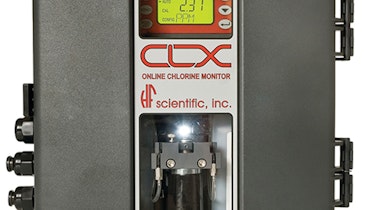By the time the HF Scientific MCX Monochloramine Analyzer arrived on the project, the Lone Chimney Water Association was facing its fair share of challenges. The Lone Chimney Water System, in the heart of Pawnee County, Glencoe, Oklahoma, serves five separate rural water districts across seven towns, delivering water to nearly 12,000 residents. It operates with the unique challenge of serving a large network of customers from a remote location.
Though it had been treating water with free chlorine for decades, Lone Chimney found itself continually struggling to reach compliance with EPA Disinfectants and Disinfection Byproducts rules. Though free chlorine is a popular water disinfectant, it’s also highly reactive with organic compounds, which can increase the production of chemical byproducts. Lone Chimney determined the best path to resolving its DBP issues would be transitioning to chloramine disinfection. Chloramines, by contrast, are less reactive than free chlorine and have more persistence in water.
At the time of the project bid, HF Scientific had not yet launched its MCX Monochloramine/Total Ammonia/Free Ammonia Analyzer. Limited to purchasing readily available equipment, the engineering team and plant staff chose an in-stock analyzer. It didn’t take long for them to question that decision. When it came time to install and start the instrument, C.A. McAllister, a plant operator, recalled it malfunctioning, resulting in reliability issues and chemical spills within the cabinet.
The right analyzer for the job
Chris Schuermann, the systems integrator, was ready to step in and clean up the mess. He knew that HF Scientific — widely regarded for its reliable, easy-to-use instrumentation — had recently launched an innovative monochloramine/total ammonia/free ammonia analyzer: The MCX. HF Scientific had supplied the turbidity and chlorine analyzers the plant already relied on, and the MCX would prove to be equally as robust and dependable. Schuermann understood the inherent and unique challenges that come with being a remotely located plant and that for this project to be successful, Lone Chimney would need an analyzer that could provide reliable, regular data to enable plant staff to maintain low free ammonia levels to minimize nitrification events.
The MCX was ready to deliver. The instrument was designed using proven HF Scientific technology and to operate continuously, unattended, for up to 30 days, all while providing accurate readings in consistent 15- to 20-minute intervals — a crucial feature for Lone Chimney’s remote location. The MCX, Schuermann knew, would be the linchpin for this project's success, providing accurate and reliable data to enable the local team to effectively mitigate nitrification events, ensure regulatory compliance and deliver clean, safe drinking water to its residents.
With a concrete plan in place and no margin for error, Schuermann knew they “needed analyzers that were (going to) be rock-solid reliable.” The MCX made good on its promise, and the results of the conversion at Lone Chimney Water Association have been transformational. Operations Manager Paul Kinder finally had the right tools to provide the data he needed to control his chloramine disinfection and free ammonia levels. Thanks to the HF Scientific MCX, Kinder says, “We are now in compliance with the DEQ on the disinfection byproducts. We are very pleased with the analyzer we have now.”





